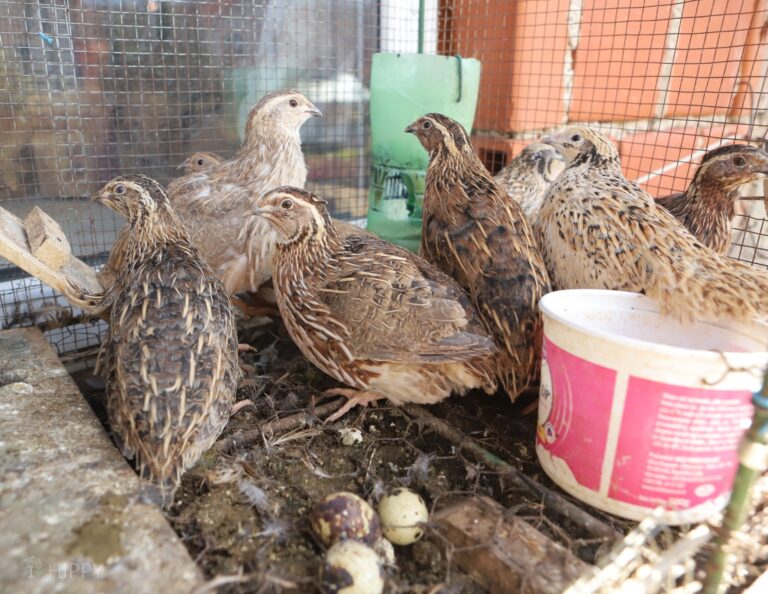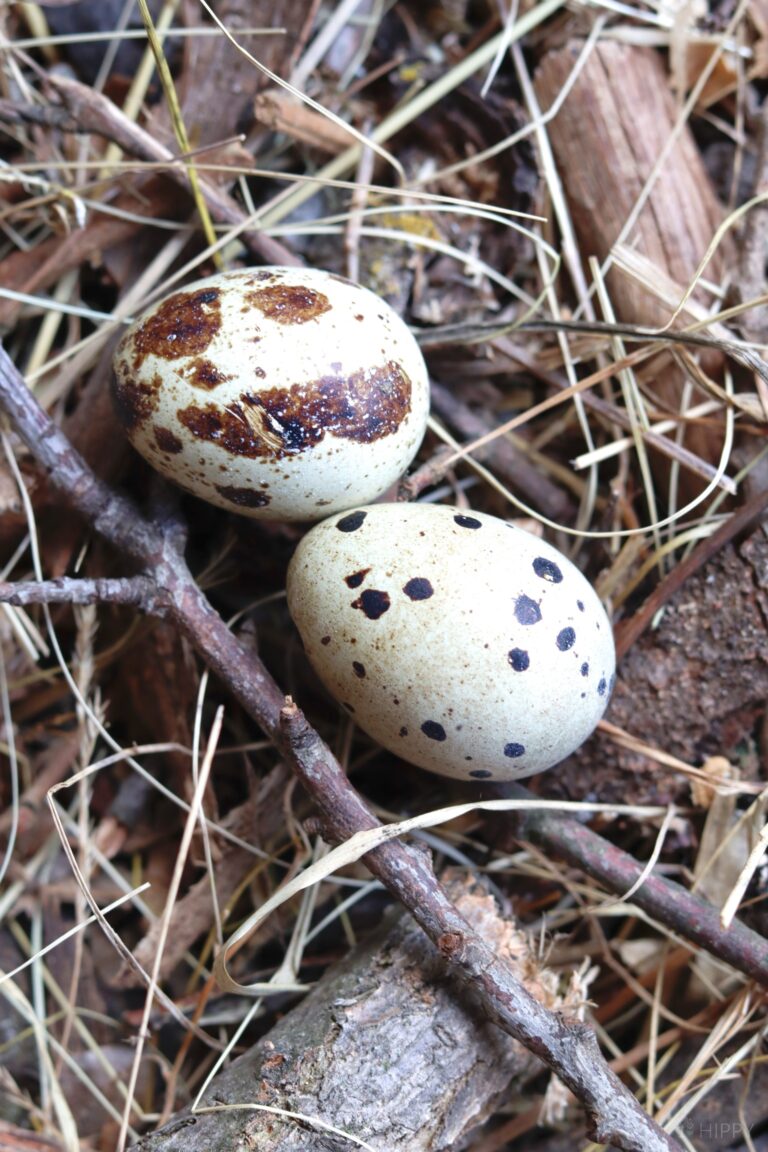If you’ve been paying any attention to homesteading and poultry-related news in the past year or so, you’ve probably already seen that quails are once again making a splash.

Much smaller than chickens, quail can nonetheless provide plenty of delicious high-quality meat and eggs, and they have other unique attributes that are making them attractive to poultry keepers.
But if you’re going to be raising quail for eggs, there’s only one thing you need to know before making a decision: how many eggs do quails lay?
Quail hens can lay around 300 eggs in captivity in their lifetime. This dependens upon breed, age, health, diet, and other factors but several domesticated species are quite prolific egg layers.
It’s hard to believe that many eggs can come out of a bird that is so little bitty. But, it’s true!
And even though quails lay very small eggs compared to chickens, they lay them quickly and reliably meaning you’ll have more than enough to sell or use in your own recipes.
Keep reading and I will tell you everything you need to know about quail egg-laying habits and what you can expect from your own covey…
How Often Do Quail Lay Eggs?
They are considered prolific egg-layers, and it’s not unusual for a healthy quail in captivity to lay more than 200 eggs in one year.
Quails in captivity do demonstrate an adherence to “peak season,” which usually lasts for the warm months during which they do all of their laying.
However, this can vary depending on the diet, living conditions, and individual health conditions of the quail.
Do Quail Lay Eggs Year Round?
Quails rarely lay eggs all year round. They tend to lay during the warm months, starting in spring and lasting all the way into fall, though some only lay in the spring and summer months.
During this time, they will need more sunlight and longer days to produce eggs consistently. This is because quails use both warmth and daylight hours as an indicator to start laying.
Providing your quails with more than 14 to 16 hours of light per day is ideal to prolong their laying cycle, and you should gradually decrease the light exposure when the days get shorter to give your quails time to rest to prepare for the next laying season.
Quails will stop laying eggs entirely, most of the time, during the winter months when daylight is shorter, and temperatures tend to be much colder.
How Many Eggs Will a Quail Hen Lay Per Day?
Quail hens are impressive egg producers and can lay up to two eggs per day, though 1 per day, every day, is typical for high-volume layers like Japanese quail.
But again, the average daily number of eggs laid by a quail hen will depend on various factors such as diet and living conditions.

Daily output is also highly dependent on age and fitness of the hen: peak egg-laying period for a young hen lasts for about six months during her first year of life. During this time, they will reliably lay up to 7 eggs a week, maybe more.
However, once the peak season ends and the hen grows older, expect the number of eggs laid to decrease significantly. An old hen that’s still laying may only lay one or two eggs a week.
Do Quails Lay in the Winter?
Typically not, though some may continue to lay (fewer) eggs during the winter months. This is because they need a cycle to rest and recuperate, and the end of the long, warm days of summer and fall signals most hens to quit laying and save their strength for next year.
If you’re raising quail yourself, you can take steps to encourage year-round egg production by providing artificial light to simulate longer days during the winter months.
This way you’ll mimic the extended daylight hours of spring and summer, and that can help keep your quails laying eggs throughout the winter.
Make sure to provide a comfortable and warm living environment during the cold winter months, too!
Do Different Breeds Lay More or Less Eggs?
Yes, different quail breeds can lay hugely varying amounts of eggs each year. For example, the Japanese quail is one of the most common breeds of quail kept specifically for egg production, and they are a common poultry species in Asia for the purpose.
Japanese quails are known for their super-high and reliable egg production levels, upwards of 300 eggs every, single year.
Other breeds of quail, like Bobwhite, can lay around 150-200 eggs annually. Far less than the Japanese, but still quite a bit for commercial production or for your family.
Try to choose a breed of quail that suits your specific needs and goals, and consider that if you want a multi-use breed, then max egg production might not be most important.
But, if you want eggs, eggs, eggs, look no further than the Japanese breed.
Will a Quail Hen Lay Eggs Her Whole Life?
Not usually. Quail hens will not lay eggs their entire lives. Like many other bird species, quail hens have a finite period of egg-laying ability.
Since quail aren’t long-lived birds even in ideal conditions, you usually only get one great year of laying from them, then a couple lesser years if you’re lucky.
In general, quails can start laying eggs during their second month of age, and rarely later than the beginning of the third. But after year 3, most hens are done. This period is once again influenced by living conditions and nutrition.
Expect your quail hens to have a peak egg-laying period that typically lasts around six months once she starts laying during her first year of life…
After this peak period, egg production will invariably decline. When that happens, it is time to make the call and cull (butcher or sell) your older hen and replace her with younger quail to maintain egg production over the long term.
Or, you can let her retire and spend the rest of her days just hanging out with you and the rest of the covey. Nothing wrong with that!
What Will Stop a Quail from Laying Eggs?
There are several issues that could stop a quail from laying eggs. Poor nutrition, disease, stress, lighting, and environmental factors all contribute to a lack of eggs.
If the quail isn’t getting enough protein, calcium, and other essential nutrients, she may not produce eggs at all, or may produce eggs that are deformed or soft-shelled.
Diseases such as egg-binding, respiratory or digestive problems, or parasites can also interfere with normal egg production and prove fatal to these tiny birds.
Stressful living conditions such as over-crowding, insufficient lighting, and chronic environmental stressors like abuse, loud noise, predator proximity (especially your own dogs and cats!) can halt egg production entirely.
Do everything you can to maintain an environment that is comfortable, clean, and stress-free for your quails.
Do Quails Go Broody Like Chickens?
They can, although it is unlikely, at least for quail we keep in captivity. Domestic quail breeds rarely if ever go broody like chickens.
“Broodiness” is the common term for behavior exhibited by birds, like chickens and quail, that sees the hen stops laying more eggs for a period of time to sit on and incubate the eggs she has already laid.
This behavior is highly variable in domesticated birds, sometimes absent entirely, and is often impacted for wild birds in captivity.
Domestic quails are a great example: they are known for their prolific egg-laying tendencies, but most keepers are pleasantly surprised if their hens ever go broody and try to hatch their own eggs.
This is further supported by the fact that artificial incubation of fertilized quail eggs is standard practice even for small coveys, since hens cannot be depended on to expand the “flock” naturally!
And although some wild-caught or heritage breed quail hens may show more signs of broodiness in captivity, it’s still not a common behavior.
Does Diet Affect How Many Eggs a Quail Will Lay?
Yes, big time! Diet plays a huge role in how many eggs a quail will lay. Adequate nutrition is essential for egg production, egg viability and the overall health of your quails.
A quail’s diet should contain a balance of essential nutrients such as protein, vitamins, minerals, and calcium. All things equal, hens that are provided with a high-quality, nutritious diet will lay more eggs than those fed a poor diet.
If your quails aren’t getting enough protein or calcium, they may produce fewer eggs, eggs with thin shells or eggs with absent or “holed” shells. Not good!
Be prepared to adjust your quail’s diet based on their age and laying tempo to maximize egg production.
Tim is a farm boy with vast experience on homesteads, and with survival and prepping. He lives a self-reliant lifestyle along with his aging mother in a quiet and very conservative little town in Ohio. He teaches folks about security, prepping and self-sufficiency not just through his witty writing, but also in person.
Find out more about Tim and the rest of the crew here.
